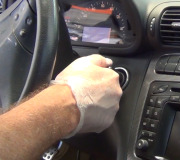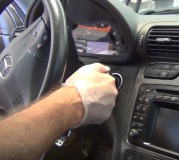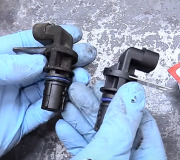I have been having a problem with my car not wanting to start or dying shortly after start.
This issue can be a fuel or spark problem-In my book fuel comes before ignition-What I want done is have your mechanic actually check the fuel pressure with a fuel pressure gauge designed for your fuel system with and w/o the pressure regulator and report back with those readings for evaluation. If it checks out have them Scope the ignition system for irregularities.
Stalling: Sensors such as the cam and crank sensors signals if the computer don't see it-it will not fire the coil and provide injector pulses. And Idle Air Control Valve not targetting the idle speed and an EGR valve that's cracked open will lean out the air/fuel mix causing it to stall to include the MAF sensor.
Refusing to start at times could be the coolant temperature sensor is out of range and computer not adjusting fuel as needed during initial cold starts.
Fuel Injection Stalling Problems
On fuel injected engines, stalling can be caused by anything that upsets the air/fuel mixture. This includes vacuum leaks or unmetered air entering the intake manifold downstream of the airflow sensor, a faulty throttle position, MAP or oxygen sensor, dirty fuel injectors, or low fuel pressure to the injectors (weak fuel pump, faulty fuel pressure regulator or restricted fuel filter). Like older carbureted engines, a defective thermostat may be preventing the engine from warming up quickly or reaching normal operating temperature. Or, a defective coolant sensor may be telling the PCM the engine is colder (or warmer) than it really is. Any of these conditions can upset the fuel calibration of the engine and cause a problem.
Idle Speed Control Circuit
One of the most common causes of stalling on fuel injected engines is the idle air control (IAC) solenoid or idle speed control (ISC) motor. If the idle speed control device fails to provide the correct idle speed, the engine may die when you slow down or come to a stop. In many cases, the idle control solenoid or motor is gummed up with carbon and fuel varnish deposits. Cleaning the idle port in the throttle body, and the IAC or ISC valve with aerosol throttle cleaner can often solve the stalling problem. If the situation is not improved after cleaning, however, the IAC solenoid or ISC motor may have to be replaced. Check the connector to the device to make sure the connector is not loose or corroded.
Engine Control Issues
Sometimes stalling is the fault of the Powertrain Control Module (PCM) or the inputs to the PCM. The factory programming may not provide enough idle speed when the A/C is on, when the alternator is under high load or when the temperature is unusually hot or cold. The fix here may be to reflash the PCM with the latest OEM update.
A faulty MAP sensor can sometimes mislead the PCM into thinking the engine is under a greater or lesser load than it actually is. The MAP sensor senses intake vacuum, which the PCM uses to estimate load so it can adjust the air/fuel mixture accordingly. If the MAP sensor isn't reading right, the PCM will receive bad information and possibly add or subtract more fuel than it should causing the engine to stall.
The same thing can happen if the throttle position sensor on a speed/density EFI system (no airflow sensor) is out of calibration or had a dead spot. The PCM may not realize the throttle is at idle, and may give the engine too much or not enough fuel causing it to stall.
When attempting to diagnose an intermittent stalling problem, therefore, it's important to always use a scan tool to first check for any trouble codes that might shed light on the condition, and secondly, to look at all the essential sensor inputs to see if they are within range and are supplying accurate information to the PCM.
Intermittent stalls that seem to happen at random are often ignition-related. A sudden loss of spark will kill the engine cold and prevent it from restarting. The most common causes for loss of spark include hot shorts/opens in ignition coils, ignition modules and crankshaft position sensors. Loose or corroded wiring connectors that cause a sudden loss of voltage in the ignition circuit will also stop an engine dead in its tracks
SPONSORED LINKS
Tuesday, September 2nd, 2008 AT 5:12 AM




